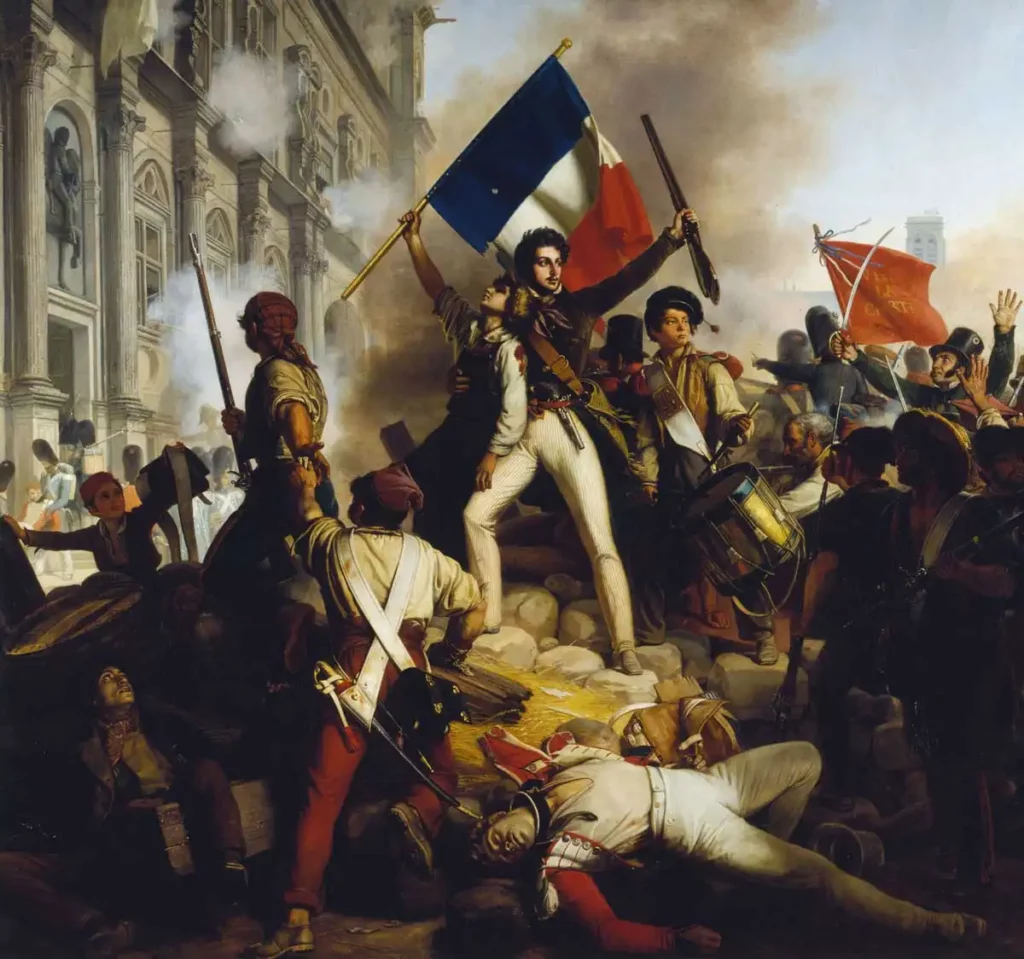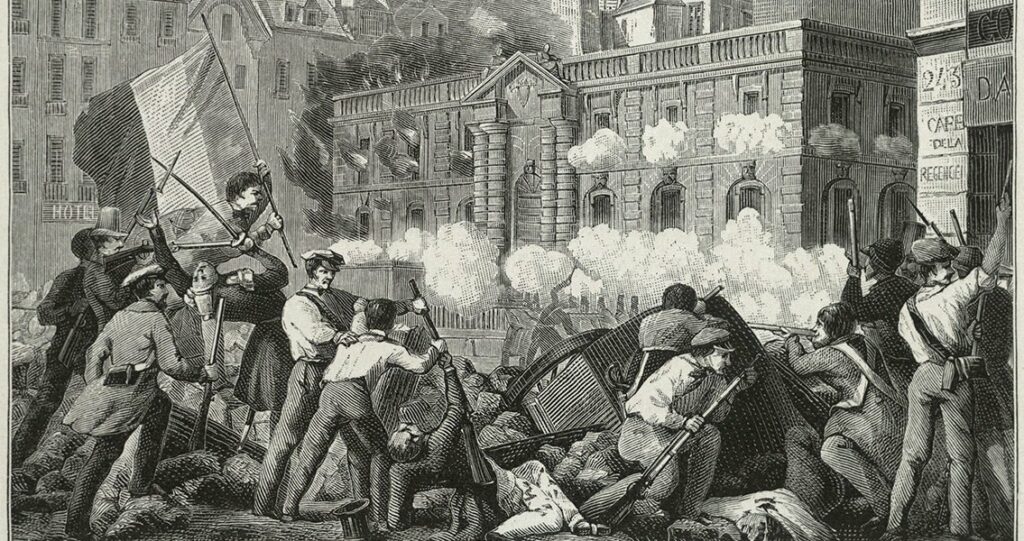It was 43 years after the storming of the Bastille that the stirrings of another rebellion, the June Rebellion of 1832, reached a fever pitch and became a true movement. While the rebellion ultimately failed and is overshadowed by the enormous impact of the earlier French Revolution, the June Rebellion of 1832 still left its mark on history–just not in the way that the rebels of the day might have expected.
Even though the June Rebellion was a failure, it spawned one of the most famous books ever written, Les Misérables. Written by Victor Hugo, Les Misérables pulled from Hugo’s real experience during the rebellion and continues to spark revolutionary thoughts in those who both read the book and see the adapted stage musical. So what exactly was the June Rebellion of 1832?

What Caused the 1832 June Rebellion?
If history has taught us anything, it’s that discontent breeds rebellion. France in 1832 was no exception.
France had already come through the notorious and bloody French Revolution and was at a moment of restless peace in 1832. There were plenty of seeds planted that could grow into a rebellion, such as economic problems, food shortages, and the failures of multiple harvests. But what really set everything off was an outbreak of cholera that broke out that spring in Paris.
Cholera is a devastating illness caused by the bacterium Vibrio cholerae, which terrified the Parisian citizens. Back then, even a small infection could be troublesome, but the intestinal infection caused by cholera was a death sentence for many. It wasn’t an easy death either, brought on by bouts of severe diarrhea, and no one knew where it was coming from.
One possibility of the origins of the cholera outbreak was the city wells, and in the poorer neighborhoods, a terrible idea started to spread–what if the government had poisoned the wells?
The government wasn’t actually guilty of poisoning the wells, even if the water of one well would eventually be identified as the culprit of the outbreak, but the idea was enough to rouse the public to restlessness.
By the end of the 1832 cholera outbreak, 18,402 lives would be claimed in Paris alone, with the number reaching above 100,000 across all of France. But it would be the loss of Napoleonic war hero Jean Maximilien Lamarque to cholera that would spark the June Rebellion.
The June Rebellion of 1832
Also known as the Paris Uprising of 1832, the June Rebellion only lasted a day but was impactful enough to stick in the mind of Victor Hugo and inspire Les Misérables. To the participants of the rebellion, though, the June Rebellion was a furious boiling over of all the hardships being laid on the poor citizens of Paris.
The funeral of General Jean Maximilien Lamarque was held on June 5, 1832, and was attended by thousands. Throughout history, public funerals often became the origin point of political uprisings in French culture, and this one was no expectation. With emotions and unrest running high, the public was primed for a rebellion.
Many of the funeral attendees were part of the republican opposition to the monarchy of Louis-Phillipe, and they whipped the crowd into taking action. In a matter of hours, the public funeral was redirected to the infamous Place de la Bastille, where the French Revolution had begun all those years before.
French citizens were joined by political refugees from other parts of Europe who were unsatisfied with French foreign policies and their lack of assistance to their home countries. General Jean Maximilien Lamarque had been a supporter of these refugees, so many of them were also in attendance at his funeral.

The crowd continued to grow, and the emotions of the gathering began to swell to uncontrollable levels. At its peak, 100,000 Parisians were present for the June Rebellion, a number that was of great concern to the monarchy.
Everything reached a boiling point when a scarlet flag was raised reading La Liberté ou la Mort (“Liberty or Death”). The crowd erupted into chaos, and shots were fired at the government troops that were trying to maintain order.
Thousands of passionate, enraged Parisian insurgents took to the streets and barricaded parts of neighborhoods against the government forces, which were now ready to shut down the rebellion by any means necessary. For a single night, the June Rebellion held control of parts of Paris.
Soon, the Paris National Guard and other soldiers under the authority of the King were able to win back control, but the impact had been made. Cholera and political unrest had driven the citizens to rebellion, and there was no taking it back. At the end of it all, combined casualties were around 800. 73 of the King’s soldiers were killed and 344 wounded. On the other side, 93 insurgents were killed and 291 wounded.
Victor Hugo, Les Miserables, and the June Rebellion
During the June Rebellion, a child named Victor Hugo was playing in a nearby garden when he first heard the gunshots.
Instead of fleeing, young Hugo exited the park and followed the sound of the gunfire. Victor didn’t know that a portion of the city had been taken by the insurgents and that these parts were barricaded off. So, when he reached his first barricade, he pivoted to head in another direction.,
Again, he ran into a barrier. Taking a third path, an alleyway, Victor was halfway down when the gates at each end of the alley were slammed shut and the youth was trapped. Without any other option, Hugo took shelter between two columns near the street.
Victor Hugo would come out of the June Rebellion unscathed, but it would stick in his mind forever.
Hugo penned Les Misérables in 1862, and the story takes place 20 years before the incident, weaving together storylines that would end at the June Rebellion. Les Misérables was hugely successful, and it shown light on a rebellion that before had been in the shadow of Napoleon and the French Revolution. Hugo sided with the revolutionaries and celebrated them through his work.
The book would later be adapted into a stage musical that would find widespread success, just like the novel. Les Misérables the musical would become the longest-running musical in the West End, and the second-longest-running musical of all time.
References
“June Rebellion: The Uprising that Inspired Les Misérables”
https://www.thecollector.com/june-rebellion-les-miserables/
“Insurrection in Paris: attempt at a new revolution – archive, 1832”

